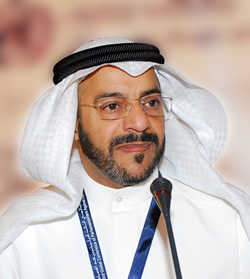|
|
|
|

Comments by GOPAC Chair Dr. Naser Al Sane
Executive Session: The Role of Legislators in the EITI Process
Wednesday 18th February at 1200-1400
Doha, Qatar
-
GOPAC, the Global Organisation of Parliamentarians Against Corruption, is an international organization of some 800+ current and former parliamentarians dedicated to the fight against corruption and for good governance.
-
Incorporated under Canadian law as a not-for-profit organization, GOPAC is guided by a global Board of Directors selected by regional chapters. The Board’s Executive Committee is chaired by me, as Global Chair.
-
In addition to developing regional chapters, member information services, and building working partnerships with expert agencies, GOPAC has identified a number of specific agenda items for the organization to pursue and report on. Resource Revenue Transparency is an important part of this agenda and has been since our 2nd Global Conference held in Tanzania, 2006.
What are the different roles of parliaments in overseeing the management of the revenues from natural resources?
-
In support of this belief, GOPAC members passed a resolution during our 2nd Global Conference in Tanzania, 2006 which directed the Executive to support changes in the international accounting standards for sovereign nations. This would require the publishing of all resource revenues received in the Public Accounts as a separate line item. The GOPAC proposal is currently being considered by IPSASB- the International Public Sector Accounting Standards Board.
-
Reporting revenues however, just the first step. Parliamentary oversight on how the government spends this money is the second, and perhaps most important step. Parliamentarians need to oversee the government’s management of public revenues from all extracted natural resources.
Internal measures
-
Ensure that their parliaments have the powers to authorize all revenues (tax rates, royalties, fee structures) and expenditures – including expenditures by Ministries and programs – and any executive decrees should be carefully circumscribed and require subsequent parliamentary review and approval;
-
Establish, as required, procedures for the approval of budgets and reports on actual expenditures and results;
-
Require that public reporting of revenues received by government from the resource extraction industry be segregated in the Public Accounts and verified on a timely basis by credible and published audit reports;
-
Require that payment in-kind (e.g. oil delivered in lieu of royalty payments) be properly accounted for, in quantity, price delivered, handling costs, price sold and verified on a timely basis by credible and published audit reports;
-
Have the authority to call witnesses, including ministers and officials, in a way which requires their attendance and response to hearings related to parliamentary oversight.
External measures
-
Set out through legislation core standards for the Executive Branch utilization of all financial instruments, including procurement, contracts, grants, and loans;
-
Set out standards for reporting to parliament (and parliamentary access to) actual revenues, expenditures and results;
-
Establish as a parliamentary agency an independent audit Office with the power to audit departmental reports and operations, and report to parliament promptly and openly on its findings;
-
Require that the auditing, investigating and prosecuting agencies be sufficiently trained and resourced to be effective;
-
Require that the governance structures of the auditing, investigating and prosecuting agencies be sufficiently diffuse and transparent to ensure confidence in their independence and credibility.
Your experience of these roles
-
In addition to my role as Chair of GOPAC, I am also the founder and current Chair of the Arab Region Parliamentarians Against Corruption (ARPAC).
-
In 2008, ARPAC launched our regional program which aims to promote transparency in budget revenues as well as strengthen Parliamentary Oversight in the region. The project was initiated by conducting five pilot studies in five countries: Lebanon, Yemen, Morocco, Jordan and Kuwait. The studies measured the state of revenue transparency in each country, the degree of parliamentary oversight of these revenues and how this is perceived by the various stakeholders in the country including: parliamentarians themselves, government officials, civil society activists, and petroleum executives from both the national and international oil companies.
-
With this information in hand, we will be comparing the results to international best practices, setting targets tailored to the specific requirements of parliamentarians. For example, proposals for policy improvements, legislation, regulations and practical steps.
-
ARPAC will also be developing training programs for parliamentarians and their staff on the basis of the project findings and recommendations.
What is the role of legislators in the EITI process?
The short answer to this is that parliamentarians can encourage their governments to join the EITI process. However, there are complementary actions that we can pursue which would support EITI and resource revenue transparency more broadly, some of which I have previously mentioned. Additional items include:
-
Improving parliamentary oversight and the consequent reduction in corruption.
-
Educate our constituents about public resource revenues in the nation and our role as parliamentarians in overseeing the use of these revenues. The media, if open and independent, can be an important tool in this process.
-
Engage in dialogue with Civil Society organisations (including EITI national chapters) and, where possible, join in resource revenue transparency campaigns.
-
Conduct outreach to parliamentary colleagues, or across borders, to raise awareness about resource revenue transparency. In addition, joining organisations such as GOPAC committed to the principles of Resource Revenue Transparency can help to build the critical mass needed for change.
|
|